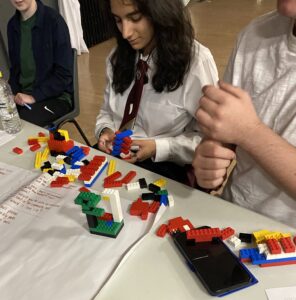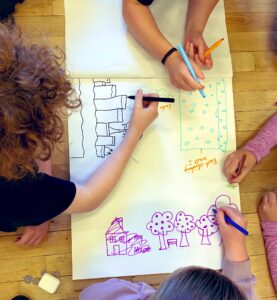Participation
Climate change participation programme 2023-2024: review
February 24, 2025 by Climate Change Public Engagement Team 2 Comments | Category climate change engagement, Guest blog
It’s now widely accepted that to tackle the climate crisis and adapt to the impacts of climate change, we are all going to have to make some transformational changes. This includes changes to the way we travel, the way we heat our homes, even the things we eat.
Many of these changes will bring wider benefits – cleaner air, healthier lifestyles, warmer homes. Some people and communities have the potential to be significantly affected. Those at higher risk of flooding, for example, or people who may need to change jobs. The transition to net zero carries concerns for many, concerns which have to be understood, recognised and reflected in government policy.
Climate change participation programme
That’s where our climate change participation programme comes in. It seeks to ensure that everyone has a chance to have their say about how Scotland should tackle, and adapt to, climate change.
It enables us to hear the views of communities across Scotland, businesses, public bodies, and organisations representing groups such as children and young people, or those living on a low income. It also provides a framework for us to engage and give feedback about how these views are shaping policy.
We aim to use what we are learning to help develop new policies and plans that will tackle climate change in a fair way – in line with our commitment to deliver a just transition to net zero.
In 2023-24, a wide range of events were held as part of the programme. We are very grateful to our partner organisations and all those who participated in events, which have helped to inform policies, such as:
- Just Transition Plans for the transport, land use and agriculture, and built environment and construction sectors: these aim to ensure that the changes required across our society to tackle climate change can also help to make Scotland a fairer and better place to live and work
- the Scottish National Adaptation Plan (SNAP3) which focuses on how Scotland must adapt to the impacts of climate change that are already upon us and putting increasing pressure on our everyday lives (such as coastal erosion, storms, flooding, wildfires and drought)
Process
Three phases of engagement were undertaken, with over 2000 participants, including:
- around 460 young people, at least 50 with little or no previous experience of engaging with government
- over 50 Gaelic speakers
- over 600 rural residents.
- at least 270 organisations from the public and private sectors
Phase 1: March 2023
A series of workshops, led by TPXimpact, identified key issues, challenges and opportunities associated with a just transition to net zero across different sectors. Participants were drawn from a wide range of representative organisations to help us develop an understanding of the needs of different groups across society.
The workshops identified a number of themes relevant to all sectors, including:
- identifying the job opportunities and community benefits that can arise from the transition
- ensuring plans are rooted in quality data
- embedding evidence of protected groups in order to tackle existing inequalities
Phase 2: May-November 2023
Events during this phase were largely based on a series of discussion papers (for the built environment and construction sector, transport, and land use and agriculture) drawing on the findings of phase 1 workshops. They set out a list of draft Just Transition outcomes for each sector for subsequent discussion with the public, public sector, business and representative groups. The outcomes were grouped under the following four categories reflecting the main goals for just transition across all sectors:
- Jobs, Skills and Economic Opportunities
- Communities and Places
- People and Equity
- Environment, Biodiversity and Adaptation
To enable a broad and inclusive programme, we undertook several strands of activity. Some were led by partners with expertise in organising and facilitating events and others by representative organisations with established relationships with specific target groups.
This variety allowed engagement with different audiences, and included webinars, focus groups, and a series of in-person, place-based events across Scotland.
Voucher payments were offered to participants to help make events more accessible and to recognise the value of their contributions.
Engagement activity took place with:
- places and groups with specific interests in the net zero transition (led by Arup)
- the public sector (led by the Improvement Service)
- business (led by Deciding Matters)
- the construction sector (led by BE-ST – globally, this sector is responsible for 40% of CO2 emissions which drive climate change)
- representative organisations which held events with people with specific protected characteristics or interests, including:
- One Parent Families Scotland
- YouthLink Scotland
- Eco-congregation Scotland
- Poverty Alliance
- Children in Scotland
- Outer Hebrides Climate Hub
- members of the public from various backgrounds – Ipsos led a series of focus groups as part of a deliberative research project overseen by ClimateXChange
- rural communities throughout Scotland, including farmers, crofters, fishermen, land managers, foresters, teachers, environmentalists, care professionals and many more – the Scottish Rural Network supported 11 in-person community workshops on just transition in land use and agriculture
Phase 3: January-August 2024
Phase 3 sought to build on the outputs of phase 2, and to consider, in more depth, issues and questions specific to a sector or plan. For example:
- a new focus group, facilitated by Ipsos, deliberated on questions relating to the distribution of costs and benefits from decarbonising heat and transport
- the Scottish Ecological Design Association (SEDA) hosted a series of events in Stirling as part of a ‘Big Conversation on Construction in Scotland’ to discuss the pathway to a just transition in the sector from an industry perspective
- Over 40 members of the Glasgow Disability Alliance came together to consider the specific impacts of climate change on disabled people ahead of the publication of the draft Scottish National Adaptation Plan 3 (SNAP3)
Further sector-based discussions were held regarding a just transition in land use and agriculture with the National Rural Mental Health Forum, students from Scotland’s Rural College (SRUC), the National Farmers Union Scotland Next Generation Committee, and others.
Outputs: Cross-cutting themes
The outputs of this wide-ranging engagement are provided in detail in the individual reports linked to above, and others presented to the Scottish Government. The following emerged as common themes:
- fair costs & benefits: fairness (whether perceived or real) in the distribution of costs and benefits is a key condition for public acceptance
- local: strong support for a place-based approach that recognises unique local characteristics and challenges
- inequalities, environment and services: the net zero transition is an opportunity to address existing inequalities (in material circumstance/climate impacts) and improve environment (green space, air quality) and interdependent services (health, education)
- leadership: government must demonstrate vision, leadership, and transparency (with honesty about trade-offs)
- behaviour change should be promoted with a focus on providing a range of attractive options and increased public education and communication
- identify co-benefits: generalised discussions produce aversion to perceived losses (of current rights, freedom, material benefit) because co-benefits of specific policies can be difficult to articulate
- timely, quality & fair delivery: trust in government (and industry) crucial to delivering pace, quality and fairness for individuals or small businesses
Impact
We are developing the Just Transition Plans that were the focus of the participation programme, taking into account the outputs of the engagement. The Plans will be put forward for consultation as the next phase in delivery, beginning with the draft Transport Just Transition Plan in February 2025.
Reflections
It’s been quite a journey and we have adapted our approach as we’ve gone along but we’re still learning! We are particularly keen to ensure that we enable meaningful engagement that has real impact on policy development. We’ve been able to reflect on a wide range of approaches, and drawn learnings on the benefits of each and when they can best be applied.
For example, we found that focus groups with participants who came together across a number of sessions allowed for deeper consideration of complex policy issues, an appreciation of different perspectives, and more informed discussions and outputs.
Engagement led by representative bodies as ‘trusted messengers’ was very valuable in providing insights on the challenges that climate change could pose to specific groups in society, and on the issues that need to be addressed to deliver what they would regard as a just transition to net zero.
You may have participated in one of the events within the programme yourself, or have some reflections on how we can build on activity to date. Please do share any thoughts or feedback at climatechangeengagement@gov.scot
The participation programme contributes to the delivery of the Public Engagement Strategy for Climate Change.
Engagement activity reports
You can read a series of reports from the engagement activities which took place in phase 2 of the programme:
- the construction sector summary report
- the One Parent Families Scotland report
- the YouthLink Scotland report
- the Eco-congregation Scotland report
- the Poverty Alliance report on built environment
- the Poverty Alliance report on transport
- the Outer Hebrides Climate Hub report
- the Improvement Service workshop summaries
Tags: climate change, community engagement, guest blog, just transition



Thank for the opportunity to read and respond to this paper.
I have read and responded to many consultations concerning Climate Change and just transition since 2023 but urgent action seems to be lacking.
I do hope our Government will now listen and promptly respond to the comments from our low income and one parents families (their difficult and unfair struggle for justice and their apposite suggestions) and to our young people for they are our future (carbon tax and ban private jets, a great idea!
Please can we now see no more empty words just urgent appropriate action. Perhaps we could have a 3 monthly report on actions taken and progress made.
Why were such a high proportion of participants Gaelic speakers? Much higher than population proportion. In fact, why include that ONE category of language?
This whole selection criteria just makes me feel that the real average person’s views are not represented.